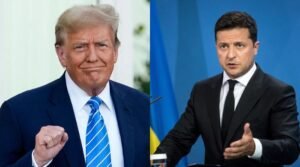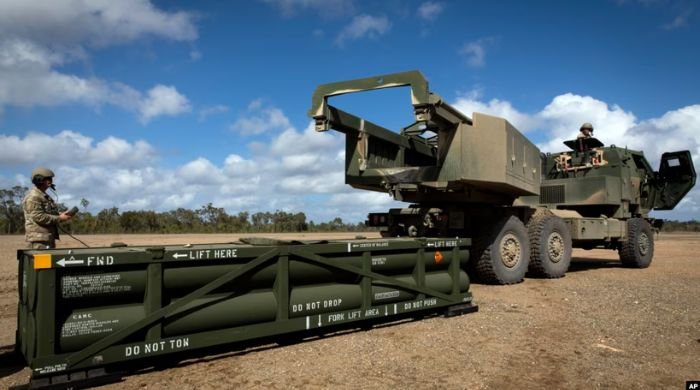Trump pauses military aid to Ukraine after a heated clash with Zelenskyy.
In a surprising move, U.S. President Donald Trump stopped all military aid to Ukraine following his war of words with Ukrainian President Volodymyr Zelenskyy in the Oval Office last week, adding to the pressure on Kyiv to agree to a deal on Ukraine’s mineral resources as a step toward holding peace talks with Russia.
“We are pausing and reviewing our aid to ensure that it is contributing to a solution,” a White House official speaking on condition of anonymity said, according to media reports on March 3.
“The President has been clear that he is focused on peace. We need our partners to be committed to that goal as well,” the official said, according to AFP.
The pause will last until Trump determines the country’s leaders demonstrate a good-faith commitment to peace, according to Bloomberg and Fox News.
“This is not permanent termination of aid; it’s a pause,” Fox News quoted a Trump administration official as saying.
Any disruption in the flow of U.S. arms to the front line would rapidly weaken Ukraine’s chance of beating back Russia’s invasion.
Democrats immediately condemned the move as dangerous and illegal.
“My Republican colleagues who have called Putin a war criminal and promised their continued support to Ukraine must join me in demanding President Trump immediately lift this disastrous and unlawful freeze,” said Representative Gregory Meeks (Democrat-New York).
The United States earlier on March 3 piled pressure on Zelenskyy to fall in line with Washington’s push for a deal to end fighting in Ukraine, while European leaders sought to carve out a stronger role after the disastrous visit to the White House.

Trump suggested his patience was running out, criticizing Zelenskyy’s resistance to the prospect of a quick cease-fire without the kind of concrete security guarantees Kyiv has been seeking from the United States.
After Zelenskyy was quoted on March 3 as saying the end of the war is “very, very far away,” Trump wrote in a social media post: “This is the worst statement that could have been made by Zelenskyy, and America will not put up with it for much longer!”
He added that Zelenskyy “doesn’t want there to be peace as long as he has America’s backing,” Trump wrote.
The post on Trump’s Truth Social platform suggested that mending ties with the White House, as European leaders have urged Zelenskyy to do, will be a difficult task following the Oval Office clash in which Trump and Vice President JD Vance berated Zelenskyy in front of reporters.
Zelenskyy left the White House on February 28 without signing an agreement granting the U.S. access to Ukraine’s rare minerals and natural resources as planned. Since the debacle, U.S. officials have urged Zelenskyy to apologize.
“What we need to hear from President Zelenskyy is that he has regret for what happened, he’s ready to sign this minerals deal, and that he’s ready to engage in peace talks,” White House national-security adviser Mike Waltz told Fox News on March 3.
Zelenskyy “should be more appreciative, because this country has stuck with them through thick and thin,” Trump told reporters at the White House later in the day. Asked if the minerals deal was dead, Trump said, “No, I don’t think so.”
Vance said in an interview broadcast on March 3 that despite the contentious Oval Office meeting, the door remains open to the Ukrainians.
“When they are willing to talk peace, I think President Trump will be the first person to pick up the phone,” Vance told Fox News.
If Zelenskyy called and said he was ready to “engage seriously on the details…then absolutely we want to talk to the Ukrainians,” he added.
European leaders moved to take more control of potential peace negotiations between Ukraine and Russia and ensure security on the continent after the recent flurry of diplomacy appeared to collapse with the rupture of relations between Trump and Zelenskyy.
Vance added in the Fox News interview that European leaders must tell Zelenskyy that the war can’t go on forever. He said they admit this in private but in public tend to “puff” Zelenskyy up.
He also defended Trump’s position that giving Washington an economic interest in the future of Ukraine will serve as a sound security guarantee.
“If you want real security guarantees, if you want to actually ensure that Vladimir Putin does not invade Ukraine again, the very best security guarantee is to give Americans economic upside in the future of Ukraine,” Vance said in the interview.
“That is a way better security guarantee than 20,000 troops from some random country that hasn’t fought a war in 30 or 40 years,” he added.
A spokesman for British Prime Minister Keir Starmer said on March 3 that there were a “number of options on the table” for a cease-fire agreement to at least temporarily halt fighting sparked by Russia’s full-scale invasion of its neighbor more than three years ago.
The statement came after French President Emmanuel Macron told the newspaper Le Figaro that he thought a one-month truce on air, sea, and energy infrastructure would give allies time to assess Russian President Vladimir Putin’s commitment to a full and lasting ceasefire.
Meanwhile, EU Commission President Ursula von der Leyen said on March 3 that she would inform member states about a “rearm Europe plan” as European governments scramble to mitigate their growing differences with the United States over the war in Ukraine.
“We need a massive surge in defense, without any question. We want lasting peace, but lasting peace can only be built on strength, and strength begins with strengthening ourselves,” von der Leyen said.
‘Manufactured Escalation,’ Says Germany’s Merz
In some of the strongest European comments yet on the White House standoff, Germany’s likely next chancellor, Friedrich Merz, referred to what he called “manufactured escalation” at the meeting, a thinly veiled criticism of Trump and his administration.
“It was not a spontaneous reaction to interventions by Zelenskyy, but obviously a manufactured escalation in this meeting in the Oval Office,” Merz told a news conference in Hamburg on March 3, adding that Europe “must now show that we are in a position to act independently.”
Despite intense and ongoing discussions on boosting Europe’s own defense capacities and alarm over warming rhetoric between Moscow and Washington, European leaders say engaging the new U.S. administration is a priority.
Merz said he would “advocate doing everything to keep the Americans in Europe.”
